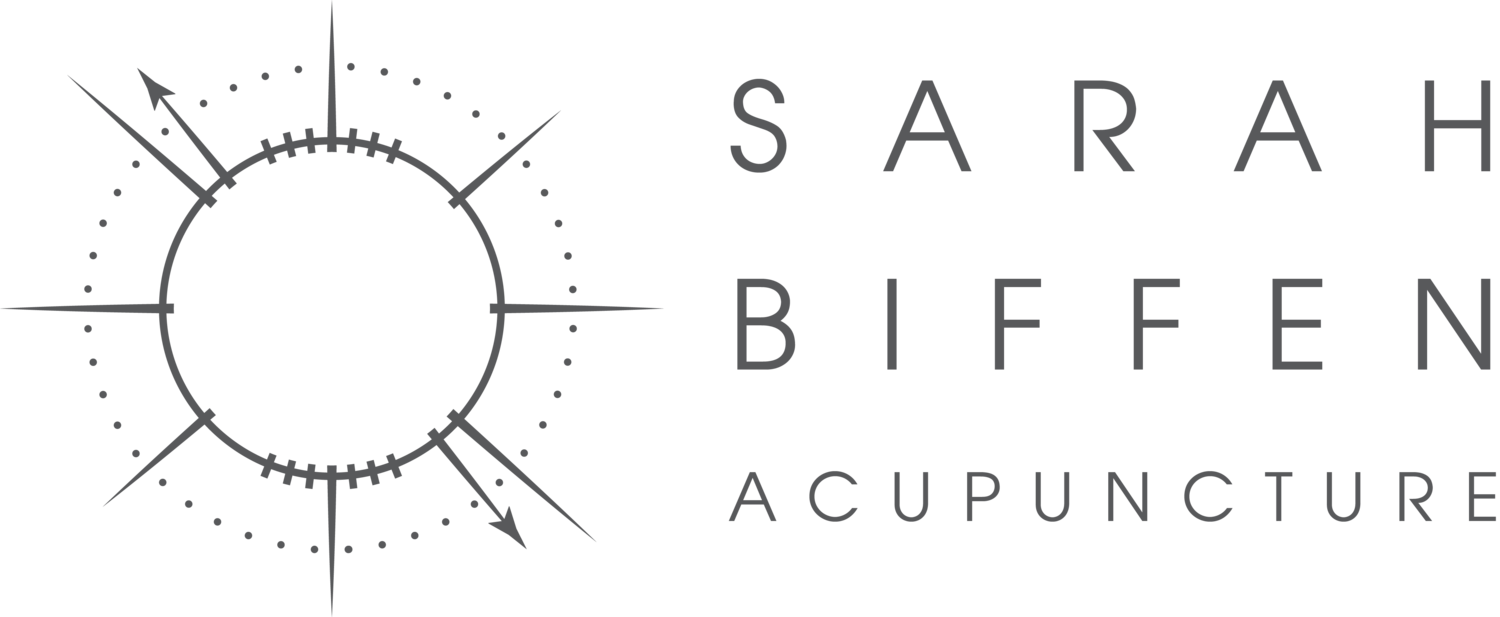Top 3 De-Stressing Acupressure Points
As the warm and blissful days of summer become further and further away in our rearview mirror, feelings of heaviness, stress and anxiety are not uncommon. My recent blog post discusses how adapting to darker days and cooler temperatures can trigger both physical and emotional responses as we transition into autumn.
While regular acupuncture treatments help to alleviate these disturbances throughout our body, there are a number of simple acupressure points that you can activate yourself that can help you de-stress.
YIN TANG
Yin Tang by @dr.sarahbiffen
This acupressure point is known to have a mentally stabilizing effect in Traditional Chinese Medicine. Yin Tang is also known as the 6th Chakra, the Center of Intuition and Spiritual Vision; stimulation activates our third eye and with it, heightened intuition and presence. Located at the glabella, (the midpoint between the eyebrows) you can stimulate this point by gently pressing it with your finger. Doing so activates the pituitary gland, which deepens our connection to others and to nature.
YIN TANG PROVIDES RELIEF IN THE FOLLOWING WAYS:
Physical Level
Headaches
Dizziness (especially after childbirth)
Restlessness
Sinus Pain and Nasal inflammation and/or congestion
Nosebleeds
Emotional/Mental
Anxiety
Worry
Agitation
Acute Fright (especially in children)
Mental Tension
LARGE INTESTINE 4 - THE GREAT ELIMINATOR
Large intestine 4 (LI4) is a major acupoint used in various treatments in Traditional Chinese Medicine. The large intestine largely regulates our digestion and bowel movements, though in TCM, it serves many other purposes as well. The large intestine is often associated with sadness and grief - the emotions we tend to spiritually “hold on” to - however, it can also support immunity as a paired channel to the lung meridian and greatly impact the flow of Qi and blood throughout the body. Quite literally, it’s an acupuncture point that encourages us to “let go” of the things that no longer serve us, physically and spiritually.
The Chinese name for Large Intestine 4 is “He Gu” which translates to converging or union valley. This point is located on the hand in the web between the thumb and index finger. This area of the hand has been described to resemble a valley, which is where it gets its name. To activate this pressure point, massage the spot with gentle to moderate pressure in small circles for several minutes.
LARGE INTESTINE 4 PROVIDES RELIEF FOR THE FOLLOWING:
Physical Level:
Headaches
Cold or Flu with Chills and/or fever
Redness or swelling of the eyes
Nosebleeds, Sneezing
Constipation
Throat, mouth, tooth, and jaw pain and related upsets (TMJ, lockjaw, tooth decay, facial paralysis, etc)
Tinnitus (ringing in the ears)
Allergies: Sinusitis, Hay fever, etc.
Promotes labor, eases childbirth (point forbidden to use during pregnancy)
Emotional/Mental
Grief
Mental Tension
DU20 - TO LIFT ENERGY, CLEAR MIND, IMPROVE SLEEP
In Traditional Chinese Medicine it is said that ‘heaven, earth and man are the three powers.’ The acupoint Du 20, also known as Bai Hui (which translates to “100 meetings”) is the point where the Governing Vessel, Urinary Bladder channel (the Gallbladder channel), the San Jiao channel and the Liver Channel converge. Du 20 is often activated to raise Yang - whenever there is too much downward energy - and is best known to lift the mood, energize and improve focus.
Located on the top of the head in the subtle depression above the tips of the ears, tap this point with all five fingers repeatedly. To step this up a notch, you could also apply aromatherapy, using peppermint or citrus essential oil to the tips of your fingers before tapping Du 20.
DU 20 PROVIDES RELIEF FOR THE FOLLOWING:
Physical
Hemorrhoids
Prolapsed uterus
Chronic diarrhea/loose stools
Heart palpitations
Emotional/Mental
Sleep disturbance
Internal wind
Overactive mind
Lifts the spirits (mood)
Low energy
Improved focusWhile regular acupuncture treatments can provide long term stress relief, tapping into the energy that exists within our own bodies can be a tremendously powerful tool.
Reach out now for more information about how Acupuncture and Chinese Medicine can help you de-stress this season and year-round.
